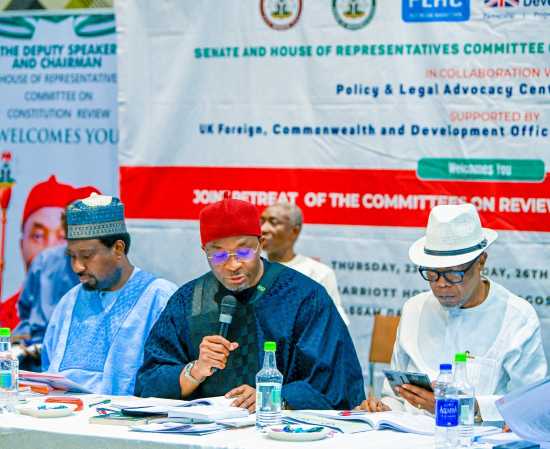The recent flooding that ravaged the Eti-Osa Local Government Area has raised fresh concerns over what the future holds for residents of Lekki, Lagos State as many begin immediate relocation from a city built on sinking sand, writes David Meshioye.
Mrs Abiola Adekoya, a resident of Agungi Ajiran, Lekki, woke up on September 23 with hopes of making fresh profits from her roasted plantain business. She carried out her early morning chores with ease as the sky grew dark — a sure sign of the impending rainfall that would soon sweep through the peninsula. With the storm’s peak nearing, she headed out, ignoring early warnings to secure her home against the heavy downpour.
Meteorologists had previously noted the distinct clouds, warning of the approaching rainfall that could bring flash floods. As predicted by the weather forecaster, heaven opened its window and let down a deluge that threw the city underwater. The single mother of two would have met a watery grave if not for the timely rescue of passers-by who pulled her out when her leg slipped into a manhole.
“I thought it was all over for me until I felt a hand pulling me out. It would have been a different story. I lost the ₦50,000 set aside to purchase plantain, but I thank God for the gift of life,” she said.
As rains poured across Lekki penultimate Tuesday, the picturesque sight of affluent and lush landscapes gave way to a harsh reality for urban dwellers: severe waterlogging.
Economic Loss
The flooding left many indelible scars on the lives of residents in the area, as many continue to count their losses. A quick visit to the Ikota area of Lekki revealed massive economic damage, with several shopping malls scooping water out of their buildings, while those on higher ground narrated how sales dropped drastically.

According to Mr Segun Odunbaku, a facility manager at Le Quidad Mall, Ikota First Gate, motorists and pedestrians were trapped in gridlock caused by flooding on several roads across the island, which had a severe impact on sales as buyers stayed back for days for fear of being trapped.
“It was a day I wanted to forget quickly, given the level of untold suffering the flood brought upon everyone on this route,” he said. “I came all the way from the mainland, and by the time I eventually got here, the day was far spent. It was a wasted day because we could not make any appreciable sales, as customers feared the flood and gridlock.”

Twenty metres from Le Quidad, Lexzy Link Auto & Property Limited lay in ruins, with interlocking stones washed away by the flood as men got down to work to raise the floor level and erect a damaged canopy.
“My job is to fix the canopy that was ravaged by the flood, while other men will work on the floor after the water washed away the interlocking stones. As you can see, we want to raise the ground to guard against future occurrences,” one of the workers, who pleaded anonymity, told The Guardian.

The schools were not left out. A quick check at The Glory of God School and Satya Sai School at Ikota revealed how they were gradually crawling back to life after days of disruption. In a chat with The Guardian, a staff member of Glory of God School lamented how students stayed in touch with the curriculum via video.
“The flood really affected our school programme as parents kept their wards away from school. We were left with no choice but to allow the students to learn from home. The school bus was also damaged by the flood, and that cost us thousands to fix. We are worried that parents might not bring their wards here once they know that the area is always flooded when it rains,” she said.
“We Live in Lekki to Compete with Our Peers, but It’s Not Worth the Stress”
Residents in Lekki now sing in discordant tunes, with many ready to relocate to the mainland, while others vow to stay put come hell or high water. For Michael Paul, the time has come to pack his belongings and head out to the mainland, having spent a decade on the peninsula. According to him, he moved to Lekki to prove a point — to compete with his peers and show that he belongs in the big league.
“I moved to Lekki in 2016 not because I wanted to, but because I needed to prove to my friends that I belong in the big league. Honestly, I realised it’s not really worth it if my experience with the last flood is anything to go by. I can confidently say that 60 per cent of people who live in Lekki moved here to show off,” he said.
However, the case is not the same for Account Manager, Miss Damilola Adinlewa, who expressed her preference for Lekki despite its many challenges. According to her, flooding has been a recurring issue whenever it rains, but her experience last Tuesday will remain vivid in her memory even if she lives to 120 years.
“It was a terrible experience for all. I was stuck in traffic from 4 p.m. and did not get home until 10 p.m. I bought five tiger nuts and ended up giving them out to those trekking home after public buses were charging between ₦10,000 and ₦15,000 from Lekki to Lakowe, and even those around Sangotedo. I don’t have any plans to leave Lekki, come hell or high water, because my house is built on higher ground.
“However, the government needs to come to the aid of people; the suffering is becoming unbearable. The government should focus on the Island by providing a subsidised transport system to ease the burden of Lekki residents,” she told The Guardian.

Holding the Authorities Accountable
Seven years ago, a severe flood in Lekki trapped many people in their homes for two days, preventing them from buying groceries. At the time, online comments mocked Island residents, suggesting they lived there to show off. Now, the narrative has changed, and people are ready to hold the authorities accountable.
The Lagos State Government has been blamed for turning a blind eye to the deplorable state of the drainage system in the Lekki Peninsula while focusing on the mainland.
The general view is that if the Federal Government generates revenue from the ports and coastal areas in Lagos and asserts claims over inland waterways and lagoons through the National Inland Waterways Authority (NIWA), then Lagos should receive 13 per cent derivation from the revenue generated at the ports to support its needs.
Ideally, there is no place in the world at one to two metres above sea level — with rising Atlantic sea levels and the high volume of annual rainfall that Lagos experiences — that does not face flooding. For instance, Rotterdam in the Netherlands has an elevation similar to Lekki, standing at about one to two metres above sea level.
The city commits €1.5 billion annually to flood prevention efforts. It is estimated that a total of €32 billion will be spent on flood prevention by 2050. In contrast, according to the National Bureau of Statistics (NBS), the entire annual budget for Lagos State, including debt, is only €1.8 billion.

Expert View
Structural Engineer and Secretary of the Ogun State Mines Association, Abiodun Adejare, appealed to the Lagos State Government to protect its mangroves and marshlands by putting an end to excessive sand-filling of the lagoon.
“The load-bearing capacity of the soil will be considerably reduced after flooding.”
The capacity of good-quality dry soil ranges between 18 and 20 tonnes per square metre. This is reduced to 12 or 14 after it gets wet. If the entire foundation is wet in a uniform way, the chances of building collapse are slim, but if a part of the foundation remains under water over a period while the rest is dry, the building can be damaged. If that happens on dry land, where do wet grounds like Lekki stand when the floods come?
“I once lived in the Ado Langbasa area of Ibeju-Lekki. The government must rise to the occasion and protect its mangroves and marshlands. Stop the sand-filling of the lagoon, remove all violations along drainage pathways, and erect a seawall and pump system,” he told The Guardian.
In its response, Lagos State Commissioner for the Environment and Water Resources, Mr Tokunbo Wahab, has suspended all reclamation projects across the state without Environmental Impact Assessment (EIA) approval. Wahab stated that the State Government cannot afford to allow indiscriminate reclamation of lagoons, wetlands, and floodplains to continue unabated, given the low-lying topography of Lagos State and its fragile ecosystem.
“Failure to comply with this directive within the next seven days will leave the Ministry with no other option than to deploy appropriate machinery to decommission the reclaimed sites, including excavation and removal of fill, and reconnecting of already blocked water channels on the lagoon, amongst others.
“While reclamation may provide space for housing and infrastructure redevelopment, it also poses significant environmental and social risks, including increased vulnerability to flooding, coastal erosion, disruption of livelihood — especially fishing — loss of wetlands and biodiversity, constriction of the lagoons and their capacity, and impairment of water quality, amongst others,” he said in a statement released to The Guardian by Kunle Adesina, Director, Public Affairs, Lagos Ministry of Environment.
Conclusion
Flooding after heavy rainfall is a complex issue that requires a collaborative approach. Talk is cheap, but the Lagos State Government must upgrade infrastructure and enforce regulations around the Lekki Peninsula, while citizens should adopt sustainable practices and take community responsibility. Together, Lagosians can effectively address flooding challenges and build a more resilient urban environment.
It remains to be seen whether the Ministry of Environment and Water Resources will enforce some of these new laws in the coming months.






